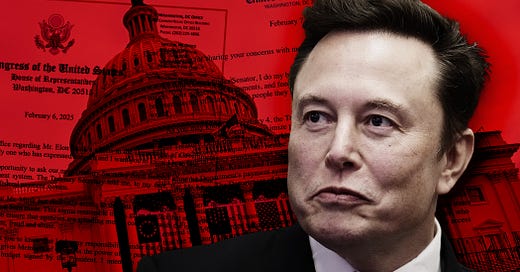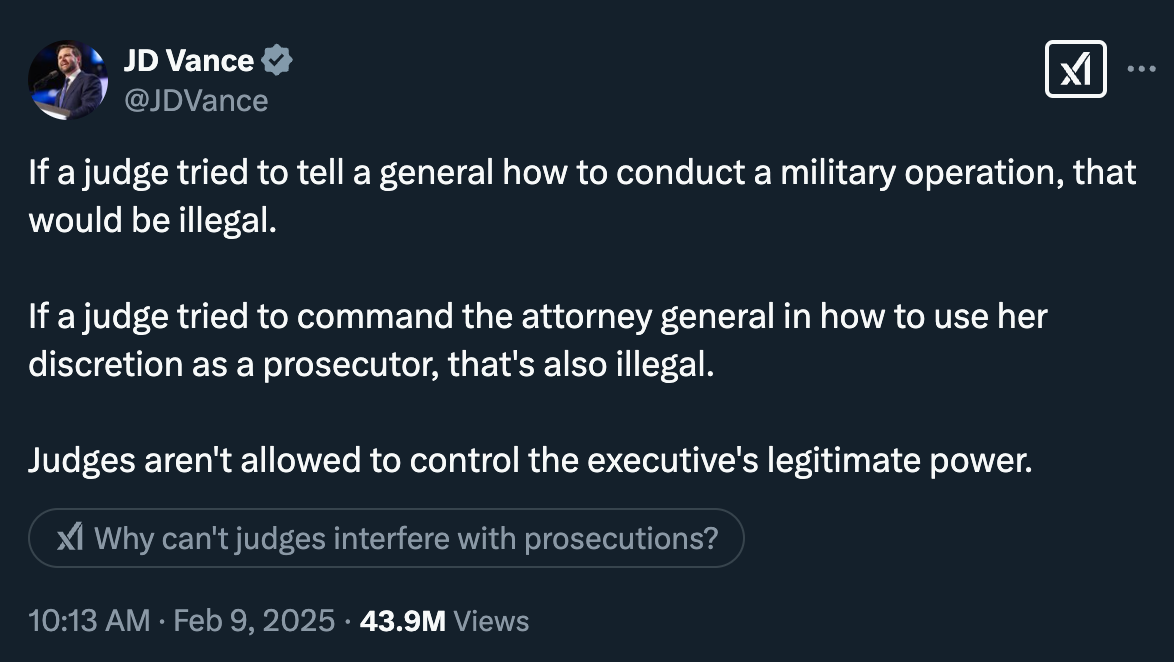
The GOP Says They Love Elon. Privately, They’re Expressing Concerns.
Republican members are sending letters to constituents promising oversight and limits on DOGE.
REPUBLICANS IN CONGRESS HAVE WIDELY praised Elon Musk as he’s gone about restructuring and in certain cases eliminating entire parts of the government.
But in private, they’ve expressed quite a different perspective on the head of DOGE and his wide-ranging initiative.
A review of letters sent by Republican members of Congress to their constituents shows many lawmakers expressing caution, even concern, about the role Musk is playing. Some members have pledged to voters that they will serve as a guardrail for DOGE. Others have expressed apprehension over the conflicts of interest that naturally result from the richest man on the planet—and a major government contractor—having such immense sway over federal spending. Even more have acknowledged fears that Musk may gain access to voters’ sensitive personal information.
“Elon Musk’s impressive track record of innovation provides valuable insights into how we can streamline government operations and leverage technology to better serve our citizens,” Rep. Rob Wittman (R-Va.) wrote in a letter to constituents. “That said, I share your concerns regarding potential conflicts of interest and overreach. Protecting the personal information of Americans is a fundamental responsibility, and any breach of privacy is alarming. The prospect of private individuals or companies having unfettered access to sensitive data raises critical questions about accountability, oversight, and the safeguarding of our citizens’ rights.”
Wittman, whose district is home to an estimated 20,000 federal employees, has publicly said that he believes DOGE would “bring some value” to the government, specifically the Department of Defense. His office did not return a request for comment.
The constituent letters, a dozen of which were shared with The Bulwark by recipients, suggest that Musk is causing nascent discomfort and increasing political anxiety among Republican lawmakers. The billionaire Trump henchman has taken a howitzer to the federal government in the first few weeks of the Trump administration, virtually erasing some independent agencies (such as USAID1), installing his own teams in many others, and waging high-pitched PR battles against anyone who would attempt to slow him down or put limits on his work.
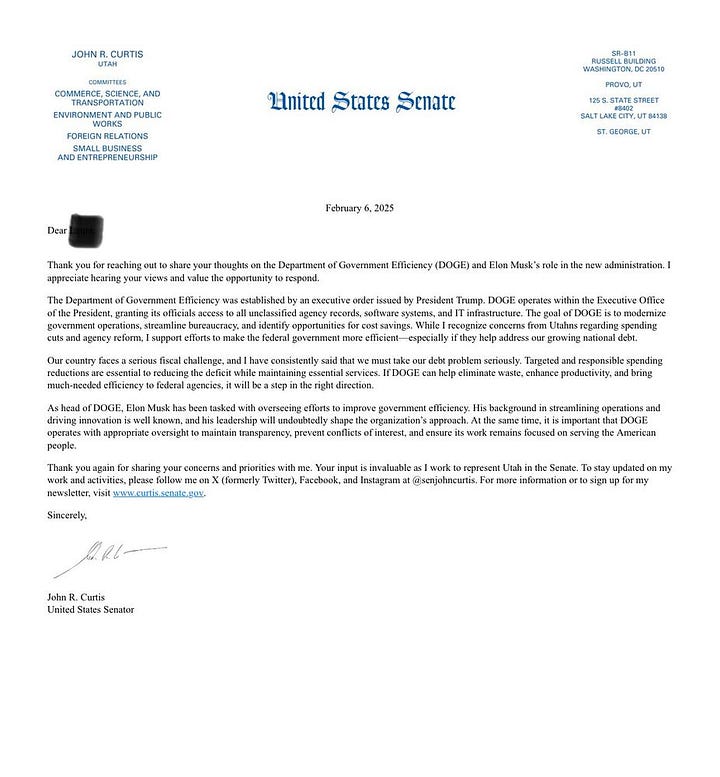
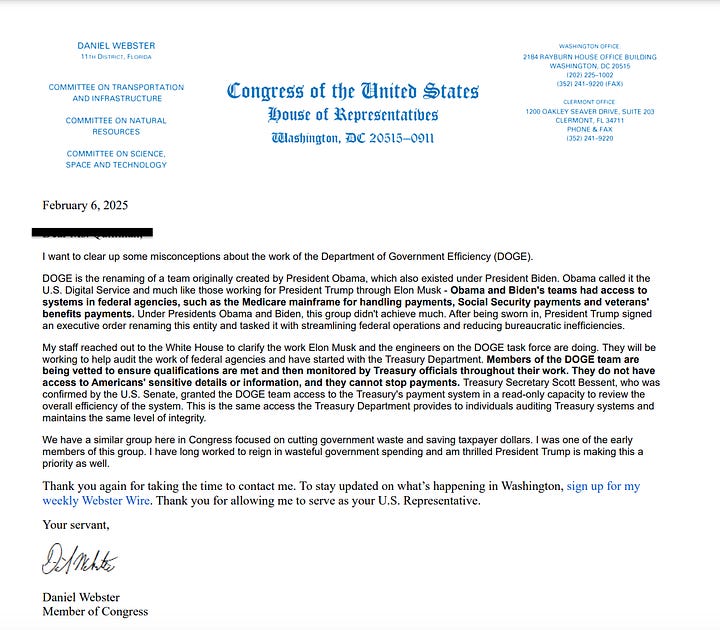
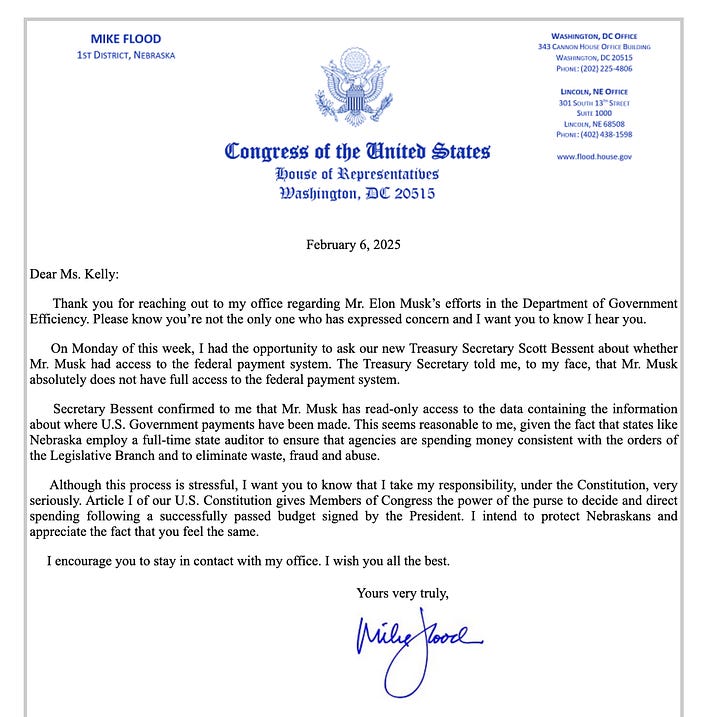
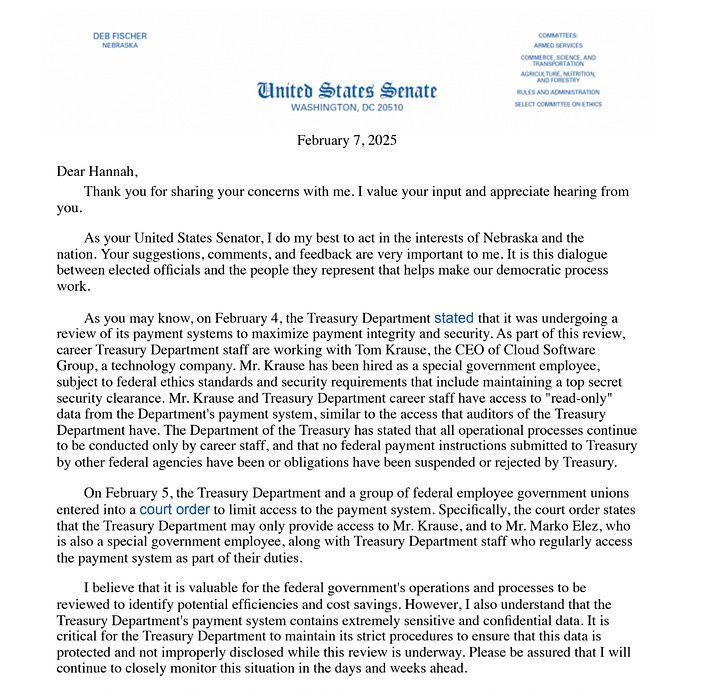
Members of Congress have acknowledged that they’ve been bombarded with calls and emails about Musk and DOGE from their constituents. The form letters the lawmakers are sending in response suggest that many of those calls are from constituents reaching out to convey opposition or concern.
In letters sent from his office, Rep. Mike Flood (R-Nebr.) went so far as to describe DOGE’s work as “stressful” to voters. He offered them his assurances: Treasury Secretary Scott Bessent, Flood wrote, had “told me, to my face, that Mr. Musk absolutely does not have full access to the federal payment system.” He pledged to take his “responsibility, under the Constitution, very seriously” to respect Congress’ “power of the purse,” and restated his intention “to protect Nebraskans.”
In his letters to constituents, Rep. Daniel Webster (R-Fla.), a member of the House DOGE Caucus, wrote that his “staff reached out to the White House to clarify the work Elon Musk and the engineers on the DOGE task force are doing.” Webster described DOGE as a fairly anodyne entity “working to help audit the work of federal agencies and have started with the Treasury Department.” He stressed that its members “are being vetted to ensure qualifications are met and then monitored by Treasury officials throughout their work.” He added: “They do not have access to Americans’ sensitive details or information, and they cannot stop payments.”
But the question of how much access DOGE should and should not have to sensitive information and systems is, in reality, a subject of intense legal wrangling. Musk’s team has sought to gain access to, and even control of, numerous federal databases, IT systems, and agencies. He has said he wants to audit the Social Security Administration, moved to upend billions of dollars in biomedical research funding, placed DOGE teams in the Department of Education, and gained access to the Treasury payment system, which disburses funds for some $5 trillion in government functions. A recent court decision sought to limit both the scope and nature of that access (restricting it read-only for a few DOGE members). But Musk has responded by pushing to impeach the judge who issued that ruling.
A major, implicit undertone of the constituent letters sent by members of Congress is that voters are now fearful that their personal data and government benefits have been put at great risk—accusations that Musk has downplayed.
Rep. Ben Cline (R-Va.) wrote in a letter that DOGE “is an essential initiative to reduce wasteful spending, cut bureaucratic red tape, and modernize government technology.” But he also emphasized that “There is no evidence to support the allegation that Elon Musk or his team has unlawfully accessed or seized sensitive data. Any access to citizen data is strictly regulated, and the role of DOGE is focused on modernizing outdated systems, not compiling private information.”
Cline’s district has more than 12,000 federal employees.
Sen. Deb Fischer (R-Nebr.), a high-ranking appropriator, stressed to constituents that she is closely monitoring Americans’ data security.
“I believe that it is valuable for the federal government’s operations and processes to be reviewed to identify potential efficiencies and cost savings,” Fischer wrote. “However, I also understand that the Treasury Department’s payment system contains extremely sensitive and confidential data. It is critical for the Treasury Department to maintain its strict procedures to ensure that this data is protected and not improperly disclosed while this review is underway. Please be assured that I will continue to closely monitor this situation in the days and weeks ahead.”
And Senator John Curtis (R-Utah) said in a form letter that it was “important that DOGE operates with appropriate oversight to maintain transparency, prevent conflicts of interest, and ensure its work remains focused on serving the American people.”
Some Republicans in Congress have gone public with these concerns, including Sen. Kevin Cramer (R-N.D.), who recently told CNN, “there have to be guardrails, obviously, on what information [Musk] accesses, but, more importantly, what he does with it,” noting that Musk is a major defense contractor.
But forthright public statements like that are the exception, not the norm. And they are usually caveated with heaps of praise for Musk. A spokesman for Rep. Flood noted that the congressman said budget cutting would be a “painful process” on Bloomberg TV last week. But the congressman also said in a separate radio appearance that he thought Musk and DOGE’s work “helps democracy.”
Other constituent form letters that The Bulwark obtained showed GOP lawmakers heaping praise on DOGE in private.
Rep. Andy Harris (R-Md.) said in his office letter: “I strongly support the DOGE efforts to streamline and improve government efficiency and performance. The fact of the matter is that after decades of senseless spending, waste, and abuse of federal taxpayers’ dollars, we are in desperate need to slash down our deficit and downsize the federal government.”
Sen. Ted Budd (R-N.C.), a member of the Senate DOGE caucus, wrote something similar: “Already, DOGE has uncovered millions spent on drag shows in foreign countries, dangerous coronavirus research in Wuhan, and pottery classes in Morocco. These dollars should have been used to benefit Americans at home or pay down the debt. That’s why I believe that we need to allow DOGE to complete its work.”
Trump, for his part, has expressed practically no reservations. He has stated that he retains the right to push back on DOGE and not agree with its findings. But he has also done little to restrain Musk and his team. The White House recently said Musk would be tasked with policing his own conflicts of interest. And after Musk posted about impeaching the judge who limited DOGE’s access to the Treasury payment systems, Vice President JD Vance condemned the separation of powers, writing that judges “aren’t allowed to control the executive’s legitimate power.”
Technically, an “independent establishment” within the executive branch.


